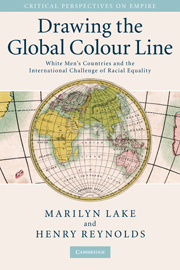 Drawing the Global Colour Line
Drawing the Global Colour Line Book contents
- Frontmatter
- Contents
- Acknowledgments
- Introduction
- Part 1 Modern mobilities
- Part 2 Discursive frameworks
- Part 3 Transnational solidarities
- 6 White Australia points the way
- 7 Defending the Pacific Slope
- 8 White ties across the ocean: the Pacific tour of the US fleet
- 9 The Union of South Africa: white men reconcile
- Part 4 Challenge and consolidation
- Part 5 Towards universal human rights
- Index
7 - Defending the Pacific Slope
Published online by Cambridge University Press: 05 June 2012
- Frontmatter
- Contents
- Acknowledgments
- Introduction
- Part 1 Modern mobilities
- Part 2 Discursive frameworks
- Part 3 Transnational solidarities
- 6 White Australia points the way
- 7 Defending the Pacific Slope
- 8 White ties across the ocean: the Pacific tour of the US fleet
- 9 The Union of South Africa: white men reconcile
- Part 4 Challenge and consolidation
- Part 5 Towards universal human rights
- Index
Summary
A victory never anticipated
Japan's spectacular victory over Russia in the war of 1904–05 stunned the world, in part because it was unexpected. Theodore Roosevelt wrote to his friend, English diplomat Cecil Arthur Spring Rice, in June 1904, explaining that he had ‘never anticipated in the least a rise as this of Japan’. The implications were global. In a letter to the British politician Lord Roseberry, Goldwin Smith, now settled in Canada, asked:
How far will Japan go? The East may now repel the West. No more spheres of influence for predatory Powers. What is the ultimate outlook for Australia or even for the British Empire in India?
In London, Valentine Chirol, the foreign editor of The Times, observed that Japan's triumph had brought the problems of the relations between all the races of the East and the West ‘to our very doors’. The American missionary and Japan expert, S. L. Gulick, agreed, believing that it opened up a new era in the history of the world, promising to halt ‘the territorial expansion of the white races and to check their racial pride’. At Oxford, Alfred Zimmern, a young lecturer in ancient history, was greatly impressed by the Japanese victory. He told his class he was setting Greek history aside for the morning, explaining:
I feel I must speak to you about the most important historical event which has happened, or is likely to happen, in our lifetime, the victory of a non-white people over a white people.
- Type
- Chapter
- Information
- Drawing the Global Colour LineWhite Men's Countries and the International Challenge of Racial Equality, pp. 166 - 189Publisher: Cambridge University PressPrint publication year: 2008


